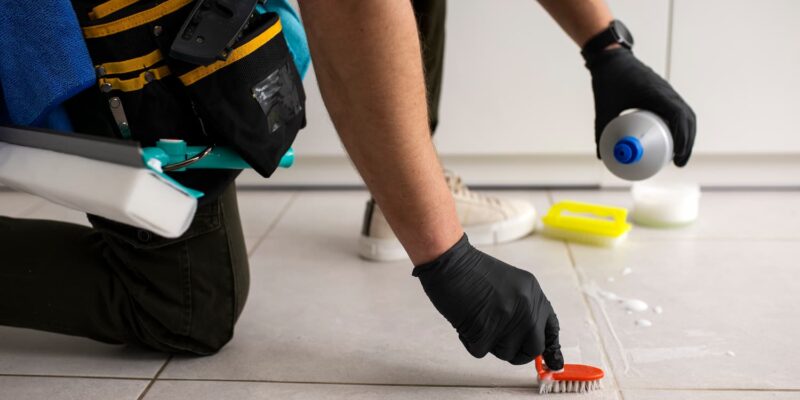Tiles are a timeless and versatile choice for flooring, offering durability and aesthetic appeal. Whether adorning your kitchen, bathroom, or living spaces, the key to preserving the beauty and integrity of your tiles lies in proper maintenance. In this guide, we’ll explore expert tips for tile and grout maintenance, helping you extend their lifespan and keep your home looking impeccable.
1. Regular Cleaning Routine
Consistency is the cornerstone of effective tile and grout maintenance. Establish a regular cleaning routine to prevent the accumulation of dirt, grime, and stains. Sweeping or vacuuming your tiled floors regularly removes loose debris that can scratch the surface. Additionally, damp mop the tiles with a mild, pH-neutral cleaner to keep them looking fresh without causing damage.
2. Grout Sealing
Grout, the often-overlooked element between tiles, is susceptible to staining and deterioration. Applying a high-quality grout sealer creates a protective barrier, preventing liquids and stains from penetrating the porous grout. Experts recommend resealing grout every 1-2 years, but this frequency may vary based on foot traffic and usage.
3. Immediate Stain Removal
Promptly address spills and stains to prevent them from becoming permanent. Different types of stains require specific cleaning solutions. For instance, acidic stains like those from fruit juices or wine can be neutralized with baking soda, while alkaline stains, such as from soap scum, may require an acidic cleaner. Always blot the stain instead of rubbing to avoid spreading it further.
4. Grout Scrubbing Techniques
Grout can be a magnet for dirt and grime, especially in high-traffic areas. For routine cleaning, use a soft brush or an old toothbrush to scrub grout lines gently. For more stubborn stains, a mixture of baking soda and water can be applied, followed by scrubbing with the brush. Avoid using abrasive materials that could scratch the tiles.
5. Steam Cleaning
Periodically incorporating steam cleaning into your maintenance routine is an excellent way to deep-clean tiles and grout. Steam not only removes dirt and stains effectively but also sanitizes surfaces. However, be cautious with natural stone tiles, as excessive heat can damage them. Always follow manufacturer guidelines and, when in doubt, consult with professionals.
6. Avoid Harsh Cleaners
While it’s crucial to keep your tiles clean, using harsh chemical cleaners can damage both the tiles and the grout. Acidic cleaners can erode grout, and abrasive cleaners may scratch the tile surface. Stick to mild, pH-neutral cleaners, and if you’re unsure about a product, test it in a small, inconspicuous area first.
7. Protecting High-Traffic Areas
In areas prone to heavy foot traffic, such as entryways and hallways, consider using rugs or mats to protect your tiles. These protective barriers help reduce the amount of dirt and debris that reaches the tiles, minimizing wear and tear.
8. Regular Inspection for Damage
Conduct regular inspections to identify any signs of damage or wear. Cracked or chipped tiles, as well as loose or discolored grout, should be addressed promptly to prevent further deterioration. Ignoring such issues can lead to more extensive repairs in the future.
9. Prevention of Water Damage
In areas exposed to water, like bathrooms or kitchens, preventing water damage is crucial. Ensure that caulking around tubs, showers, and sinks is intact and in good condition. Damaged or deteriorating caulking should be promptly replaced to prevent water from seeping into the subfloor and compromising the integrity of the tiles.
10. Professional Cleaning and Maintenance
While regular maintenance goes a long way, periodically enlisting professional tile and grout cleaning services is essential. Professionals have access to advanced cleaning equipment and solutions, ensuring a deep and thorough cleaning that goes beyond what regular household cleaning can achieve. This not only rejuvenates the appearance of your tiles but also addresses hidden contaminants.
Conclusion
Tile and grout maintenance is a combination of consistent care, proactive measures, and occasional professional intervention. By incorporating these expert tips into your routine, you can prolong the lifespan of your tiles, keeping them looking pristine for years to come. Remember that proper maintenance not only enhances the aesthetics of your home but also protects your investment in quality flooring. With a commitment to care, your tiles will continue to adorn your spaces with timeless beauty and resilience.








Comments